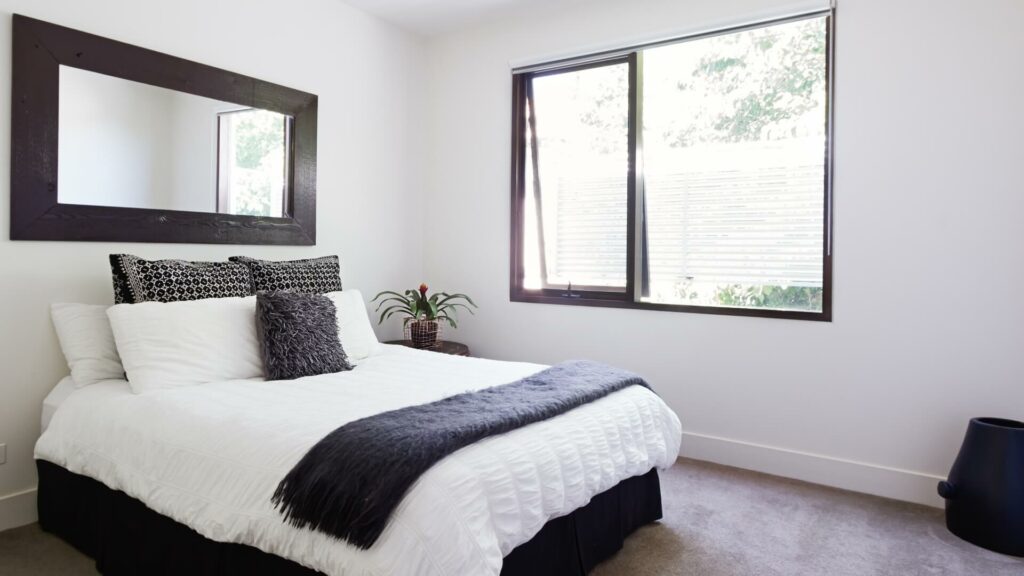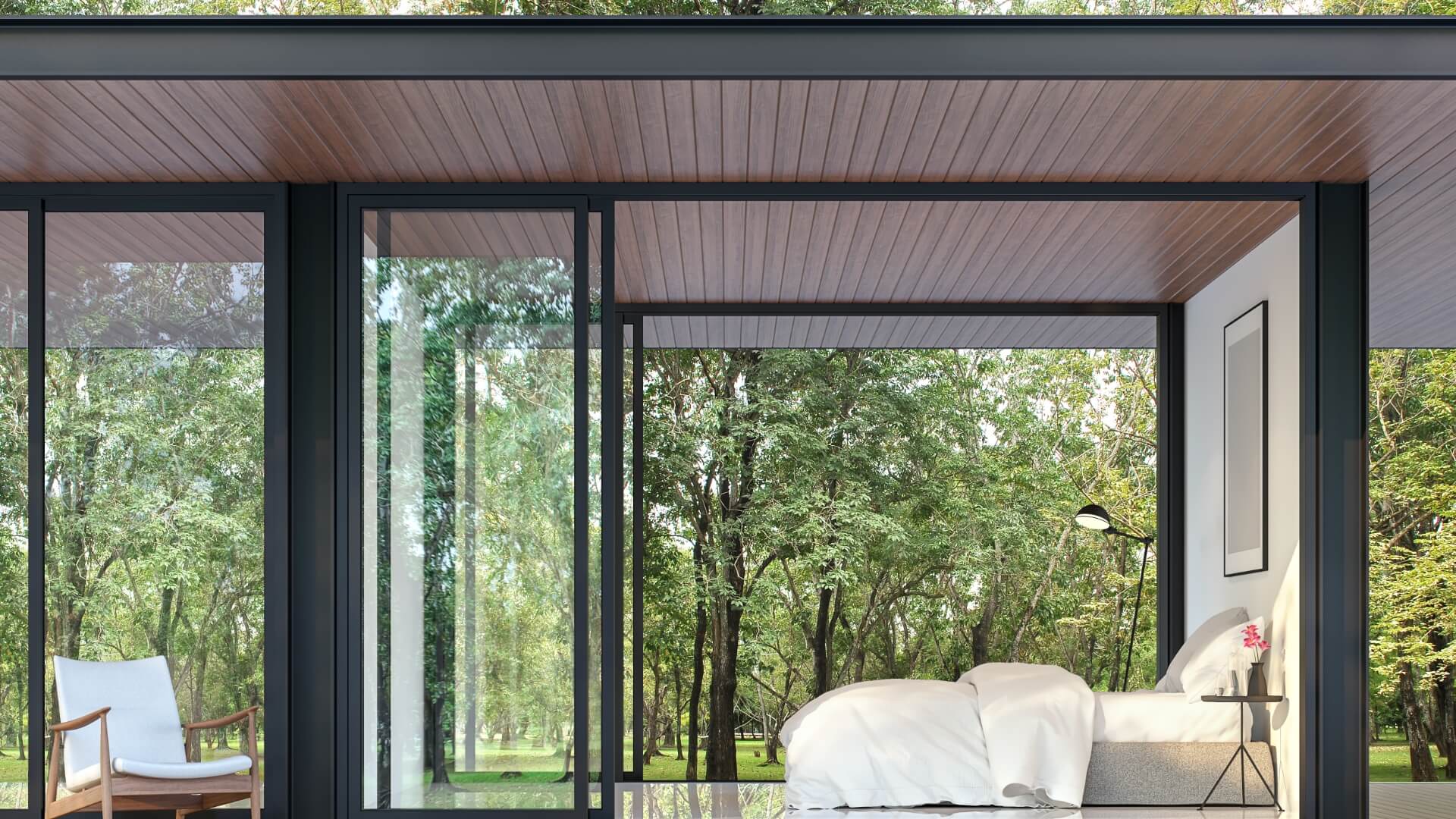From home offices to garden gyms, building an additional room outdoors is a flexible solution to many problems. However, now as visiting is increasing and socialising resumes, people are looking for additional living and sleeping space and wondering if a garden room can be used as a bedroom?
From the legalities of a garden room bedroom to whether it’s possible to sleep in a garden room, here’s your quick-start guide.
Table of Contents
Can You Sleep in a Garden Room?
Yes, the simple answer is you can sleep in a garden room providing it complies with building regulations.
Garden rooms are built to very high standards and often have the same features you would find in your house, such as uPVC windows and doors, electricity, and WiFi, but a garden room must comply with building regulations to be used as sleeping accommodation.
This means it needs to be an appropriate size and with proper insulation, heating, and electrical work as well as fire safety requirements to make it habitable.
Most garden rooms are exempt from building regulations but that’s not the case if you’re going to be sleeping in it. The majority of standard garden rooms do not meet the required building regulations for sleeping accommodation and so cannot be slept in, even on occasions.
Why Build a Garden Room Bedroom?
If your family has outgrown your current home, but you are not considering moving, you might be wondering about the possibility of a garden room bedroom. Whether your children can no longer share a room, or you need an extra bedroom for guests, a garden room could be the answer.
The way your new garden room is built will depend on your intended use for the space, as a home office or gym does not legally need to meet the same requirements as a bedroom.
Bedrooms are considered self-contained sleeping accommodation and must be designed as a habitable room. This means considering aspects such as fire safety and providing sufficient space.

Building Regulations for a Garden Room Bedroom
Building regulations exist to make sure that a construction is up to standard and safe to use. As sleeping accommodation, a garden room bedroom must meet stringent requirements and be signed off by a Building Control Officer (BCO).
Your garden room supplier will be able to provide specific details on how your new space can be built in compliance with the current building regulations. However, before you start construction, you must state that you want to use your garden room as a bedroom, so they can plan accordingly.
Even if you plan to use your garden room as an occasional bedroom for guests, it is a legal requirement that it meets these standards and is approved by a building control body.
Do You Need Planning Permission to Sleep in a Garden Room?
Another key consideration when building a garden room bedroom is planning permission. There is often a lot of confusion around the requirements for planning permission for outbuildings such as garden rooms, and it can be a complex subject.
Whether or not you need planning permission often depends on the location and scope of the building being erected. For the majority of garden rooms, planning permission is not required because of “permitted development” rights.
What Counts as Permitted Development?
Permitted development means that outbuildings can be built on a property without planning permission, as long as it meets these parameters:
- A single-story building with a maximum height of 3 metres and a maximum eaves height of 2.5 metres. With a dual pitched roof, the maximum height can be 4 metres.
- Not build on land which is forward of a wall that forms that of the principal elevation.
- If a building, enclosure, or container is within two metres of the boundary, the maximum height is 2.5 metres.
- Have no raised platforms, balconies, or verandas.
- Take up no more than half the land area around the original house.
- Is for incidental use.
What’s the Difference Between Ancillary and Incidental Use?
It is often assumed that it can be built without planning permission as long as an outbuilding remains in dimensional restrictions. It all comes down to what is considered incidental use and what is ancillary use. A garden room built for incidental use will generally not require planning permission, whereas one for ancillary use does.
- Ancillary Use (Requires planning permission): Covers anything which you would do in a standard house, such as sleep, eat, watch tv, shower, or study.
- Incidental Use (No planning permission required): Covers almost anything else that doesn’t fall under ancillary use, including storage, exercise, and hobby use.
In simple terms, incidental use depends on the primary home and could not exist without it. In contrast, ancillary use can be standalone and extends the normal living accommodation of a property.
This means a garden room bedroom will require planning permission, whereas a garden room as a home gym would not. Speak with your supplier about your intended use and work with them to apply for planning permission.
Key Factors to Consider When Creating a Garden Room Bedroom
If you plan to build a garden room bedroom on your property, there are many things to consider on top of the rules and regulations.
- Bed Size: Think about the size of the bed you would like to fit into this new space. Some homeowners choose to use a sofa bed in garden rooms which are being used as a spare bedroom, but for permanent sleeping accommodation, you might need space for a double or single bed. Make sure there is enough floor space to have adequate room around the bed, as well as space for other furniture such as a side table and dresser.
- Electricity: Your garden room bedroom will need electricity for lighting, power sockets, and other devices. Make sure you can fit an electricity supply into your garden room by discussing it with your supplier.
- WiFi: Whether it’s a guest room or a permanent bedroom, you will likely need WiFi in your garden building. If your guests or family members want to stream films or catch up on the news in the morning, a WiFi connection is vital.
- Heating: Garden rooms can get very cold, particularly in the winter and overnight. Consider how you’re going to adequately heat the room.
- Plumbing: If you’re going to have people sleeping in a garden room, you’ll probably also want to consider fitting a bathroom as well.
Conclusion – Are They Worth It?
Ultimately, a garden room can make a great extra bedroom in your home or even be used as a short-term stay such as an Airbnb, but legal compliance is essential.
You will need to discuss building regulations and planning permission with your supplier before drawing up your plans to make sure the space is suitable as sleeping accommodation.
If you’re still considering a garden room and not sure how you will use the space, but are considering it as a bedroom, it is usually easier to start by complying with the necessary building regulation at the beginning than retrospectively make alterations. While the investment (and the admin) at the beginning may be higher, it does mean you have a more versatile space that gives you lots of options.

